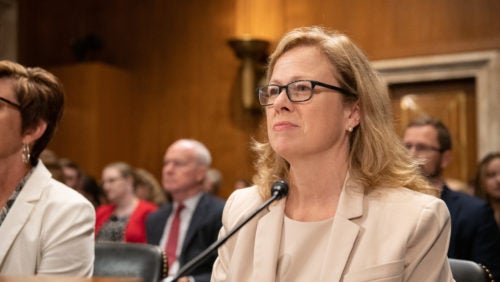On the Hill: Professor from Practice Vicki Arroyo on Investing in Transportation Infrastructure
July 10, 2019

On July 10, Assistant Dean and Professor from Practice Vicki Arroyo (L’94), executive director of the Georgetown Climate Center (GCC) at Georgetown Law, testified before the Senate Committee on Environment and Public Works in a hearing entitled “Investing in America’s Surface Transportation Infrastructure: The Need for a Multi-Year Reauthorization Bill." (Photo Credit U.S. Senate)
On July 10, Assistant Dean and Professor from Practice Vicki Arroyo (L’94), executive director of the Georgetown Climate Center (GCC) at Georgetown Law, testified before the Senate Committee on Environment and Public Works in a hearing entitled “Investing in America’s Surface Transportation Infrastructure: The Need for a Multi-Year Reauthorization Bill.” The purpose of the hearing, according to Chairman John Barasso (R-Wyo.)(C’74)(M’78) and Ranking Member Tom Carper (D-Del.), was to inform a planned bipartisan highway infrastructure bill.
Testifying two days after the record-breaking rain and dangerous flash flooding in the Washington, D.C., area, Arroyo told the committee of some of the alarming statistics with respect to climate change and what states — often with the help of the GCC — are doing to transition to low-carbon transportation solutions.
Projects include the Transportation and Climate Initiative (“TCI”), launched by the Northeast and Mid-Atlantic States to develop the clean energy economy, improve transportation, and reduce emissions. This bipartisan collaboration of energy, environment and transportation agencies from 12 states and the District of Columbia is facilitated by the GCC and is designing a regional policy to accelerate the low-carbon transition.
“Congress has an opportunity to expand on such initiatives, fund innovative programs that expand access to transportation and support new technologies that offer promise for emissions reduction and economic growth,” she said, noting that in the TCI process, stakeholders have offered strategies and solutions including pricing carbon, the electrification of transportation, smart growth and transit-oriented development, and improving ports and other facilities with higher levels of pollution. But federal leadership is needed to shift to low-carbon and more resilient transportation.
In oral and written testimony, Arroyo called for federal funding to drive investments in electric vehicle charging stations; decarbonizing trucks and buses with the deployment of battery electric and hydrogen fuel cell vehicles; and ensuring that transportation systems can withstand the impacts of climate change.
“Federal hazard mitigation grants save $6 for every $1 spent, yet many states and cities are struggling to prepare and need federal support,” Arroyo said, adding that GCC’s Transportation Resilience Case Studies highlight state and local efforts including New York’s Community Risk and Resiliency Act and Maryland’s “Coast Smart” program.
“Congress should ensure that federal infrastructure investments are built to withstand flooding, increased heat, and other climate change impacts…States and communities need tools and technical assistance, and should have incentives to plan and to modify codes and standards ahead of disasters to facilitate resilient rebuilding when funds are available.”